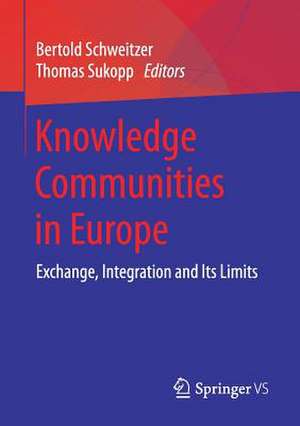Knowledge Communities in Europe: Exchange, Integration and Its Limits
Editat de Bertold Schweitzer, Thomas Sukoppen Limba Engleză Paperback – 18 ian 2018
Preț: 379.48 lei
Nou
Puncte Express: 569
Preț estimativ în valută:
72.61€ • 75.67$ • 60.12£
72.61€ • 75.67$ • 60.12£
Carte tipărită la comandă
Livrare economică 03-17 aprilie
Preluare comenzi: 021 569.72.76
Specificații
ISBN-13: 9783658188511
ISBN-10: 3658188510
Pagini: 164
Ilustrații: VI, 164 p.
Dimensiuni: 148 x 210 x 18 mm
Greutate: 0.21 kg
Ediția:1st ed. 2018
Editura: Springer Fachmedien Wiesbaden
Colecția Springer VS
Locul publicării:Wiesbaden, Germany
ISBN-10: 3658188510
Pagini: 164
Ilustrații: VI, 164 p.
Dimensiuni: 148 x 210 x 18 mm
Greutate: 0.21 kg
Ediția:1st ed. 2018
Editura: Springer Fachmedien Wiesbaden
Colecția Springer VS
Locul publicării:Wiesbaden, Germany
Cuprins
Introduction.- Social epistemology as the philosophical framework for investigating knowledge-communities in Europe.- Dissemination of knowledge in European scientific networks in 18th century: the case of oxygen.- The scientific Paths to Europeanization: A critical sociological perspective upon the European Space Program.- Expert communities and security: Neofunctional integration in European policing practices.- The role of visible and invisible hands: Scientific communities and political integration.- The European Union’s Research and Innovation Policy as intentional community building.-Experts in EU Policy-Making: towards evidence-based problem-solving in research and innovation policy?.- Educating the people. Spanish intellectuals and reform strategies in the 19th century.- Networking in Science and Popular Science: An Anglo-German Knowledge Space in the 19th Century.
Notă biografică
Dr. Bertold Schweitzer is Lecturer in Politics and Philosophy at the University of Dundee.
Dr. Thomas Sukopp is Senior Lecturer in Philosophy/Didactics of Philosophy at the University of Siegen.
Textul de pe ultima copertă
How do transnational communities of scientists emerge and evolve, and how does scientific cooperation interact with social and political integration in Europe? This collection assembles a wide array of analyses from philosophy and sociology of science and the social sciences tackling these questions from various perspectives. The contributions from philosophy investigate the foundations of social epistemology, and the features and development of significant transnational research communities in the natural sciences, while those from sociology and political science examine the various forms of interaction between transborder scientific and other expert activities and broader social and political integration. They are united by advancing our understanding of the complex network of transnational intellectual discourses, identities, interests, and integration in Europe.
Contents
Discoveries of oxygen and the «Chemical Revolution» in the context ofEuropean scientific networks. – From interaction to integration? Transnational scientific communities in biology. – Science and the manufacture of a political order: A sociological study of the European manned space programme. – European research programmes: Spaces of knowledge or economic tool? – Expert communities and security: Neofunctional integration in European policing practices. – An epistemic-consequentialist social epistemology as an epistemological perspective concerning the investigation of a common, European knowledge community
Target Groups
Lecturers and students of natural and social sciences and philosophy
Practitioners in science promotion and science management
The Editors
Dr. Bertold Schweitzer is Lecturer in Politics and Philosophy at the University of Dundee.
Dr. Thomas Sukopp is Senior Lecturer in Philosophy/Didactics of Philosophy at the University of Siegen.
Caracteristici
New approach to the knowledge exchange processes in Europe An inter- and transdisciplinary book Networking in Science and Popular Science
